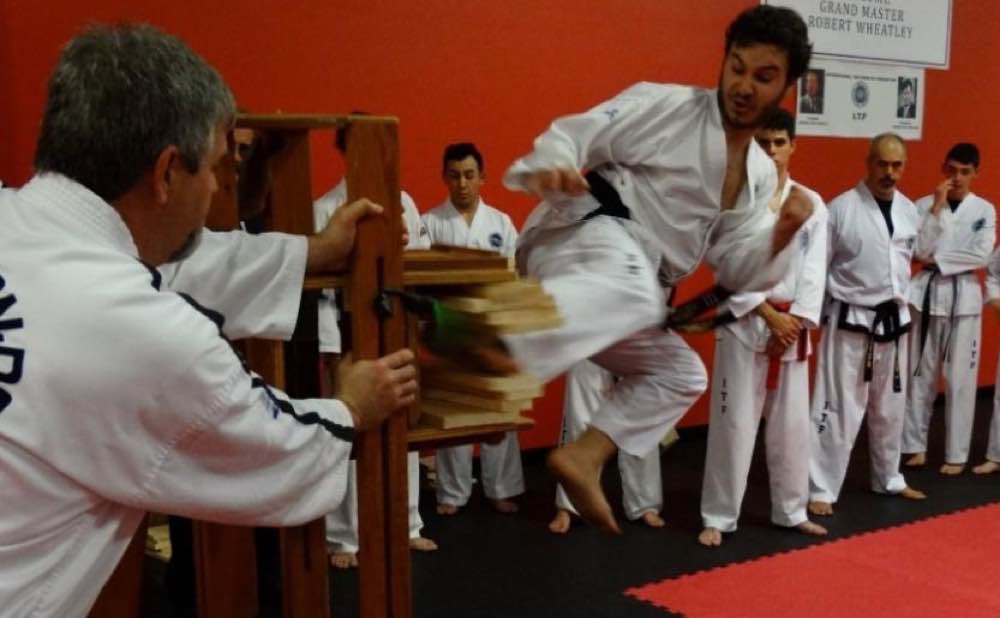Flying leg break during a black belt test in 2016
I stood facing a wall of black plastic boards, faintly hearing “U-S-A, U-S-A” chanting from the rest of our team in the stands. I measured the distance from the board with my leg, took a deep breath, and then performed a kick that I had practiced hundreds of times. I do not even think I felt the boards with my foot as my kick sliced clearly through them. I heard a loud cheer from my teammates, my coaches, and my parents. I had broken all my boards, putting us in a tie for first place.
This was 2012 and I was a member of Team USA. We were in Ottawa, Canada, at the World Taekwon-Do Championship and I was competing in Junior Men’s Team Board Breaking. Each member performed one of four techniques to break a pre-determined number of boards. All three of my teammates successfully broke theirs before it was my turn. With my successful break, we went into a tie for first place with England. Unfortunately, it was late at night, so the tiebreaker was postponed to the next morning. Just like I had to wait, you will have to wait to find out how that story ends.
I have been training for over seventeen years now. I have earned the rank of fourth-degree black belt, which required me to memorize 26 different forms (collection of moves performed sequentially), instruct classes, take four increasingly difficult written tests, and write a five-page thesis. My favorite part of Taekwon-Do is competition, with its categories of forms, sparring (hand to hand and foot to foot combat), weapons demonstration, and board breaking. Since my first international competition in 2010, I have competed in Canada, Italy, South Korea, Argentina, and multiple states across the US. It turns out that preparing for case interviews is fairly similar to preparing for Taekwon-Do Competitions.
Learning Frameworks
While my martial arts journey has been long and difficult, it has also been rewarding and improved my professional life as a future consultant. For example, in Taekwon-Do you learn forms or patterns of moves, which increase in difficulty as you test for a higher belt. You need to master the previous techniques before you move on to the next one. In consulting, you must master certain frameworks before you move on to the next one. You cannot jump right into black belt patterns, much like you cannot jump right into full due diligence or merges and acquisitions without first mastering the simpler profitability framework. In addition, when learning new kicks and punches, students like myself consult instructors or encyclopedias to help us perfect techniques, much like we consult videos and books when we need to learn new frameworks and methods of analysis. Martial arts have taught me discipline and the ability to learn new things, while also striving to perfect what I already know, which I employ as I prepare for the case interviews.
Setting Goals
Once patterns are polished and performance-ready, students test for a new belt or compete in a tournament. However, belt testing and national competitions only occur every few years. Thus, preparing for these events requires long-term planning plus the ability to break down larger goals into smaller tasks. While preparing, I must perfect my techniques, adjust my weight for my sparring category, strengthen my hands and feet for board breaking, and fundraise for travel costs. This goal setting with subtasks resembles the application and interview process, which also is a once-a-year opportunity. To receive a job offer you must write a resume and cover letter, attend recruiting sessions and coffee chats, network with current consultants, and practice interview questions. Preparing for tests and competitions taught me how to break down big goals into smaller and more manageable tasks, much like preparing and applying to consulting positions.
Performing and Executing
Once goals are identified and preparations completed, the final step is execution. Whether it is a black belt test or a competition, the challenge is the same: a performance. Not only are multiple black belt judges watching you, but so are the fifty other countries in attendance. To complicate matters, there are often other rings of competition running simultaneously. I can recall in Argentina in 2018 at the world championships, various national anthems were playing for medal distribution during my competition. But through my training and intense focus, I blocked out all distractions mentally. As a result, I won my match against my German competitor. This ability to keep your composure is the same kind of focus that one needs to display during job interviews and salary negotiations. Case interviews and personal experience questions are performances, and you must be on your game the entire time. Thus, conducting mock interviews are a good way to mimic the pressure and stresses of the real event for you to practice blocking out all distractions.
A Hard-Earned Victory
I promised the ending to my story. Upon returning to the arena the next day, a tiebreaker was held. One member of our team was randomly selected to complete another break. He successfully broke his boards, three with his hand, and then England went next. While they were confident that they could keep up, their team member failed to break all the boards. With that, we were World Champions.
You too can achieve success in your consulting interviews. The recipe includes memorizing business problem frameworks, setting short-term and long-term goals, and prepping to execute the interview like a performance. Following these steps, you can look forward to earning a hard-fought victory in the form of receiving consulting offers.
Ricky Hollenbach is a third year Ph.D. student at Duke University in Mechanical Engineering, studying unsteady aerodynamics and mechanical vibrations in jet engines and turbomachinery. He aspires to become a management consultant in the aerospace and defense fields.
Image: Ricky Hollenbach
